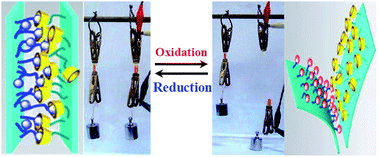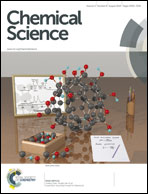Flexible and voltage-switchable polymer velcro constructed using host–guest recognition between poly(ionic liquid) strips†
Abstract
A robust and flexible polymer velcro was synthesized via surface modification of poly(ionic liquid) (PIL) membranes with ferrocene (Fc) and β-cyclodextrin (β-CD) moieties, which act as the hooks and loops, respectively. Through molecular recognition between the β-CD and Fc moieties, the prepared PIL-β-CD and PIL-Fc membranes adhered with each other under mechanical compression, without the use of any curing agents. This polymer velcro exhibits strong adhesion in air and in aqueous solutions (including acidic and basic water, and artificial seawater), and could be unfastened and fastened by mechanical and chemical means. Due to the intrinsic ionic conductivity of the PIL membranes, our polymer velcro possesses an unprecedented feature, that the adhesion reversibility can be electrochemically controlled by the applied potential.


 Please wait while we load your content...
Please wait while we load your content...